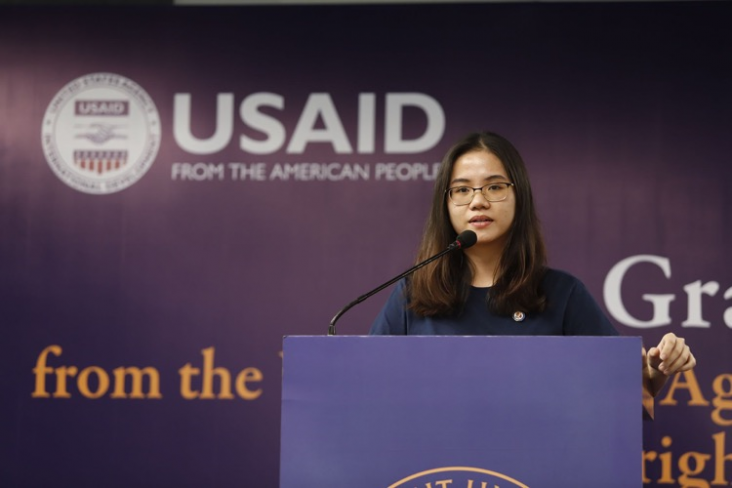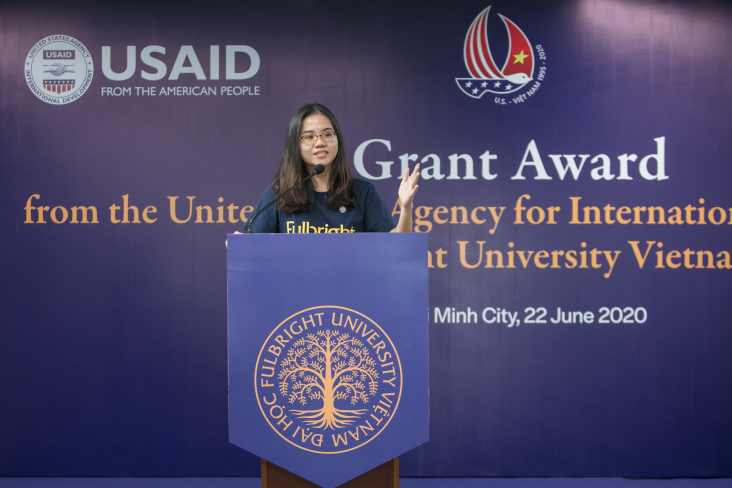Speeches Shim

By March, 2020 Vietnam had confirmed its first 100 cases of a novel coronavirus outbreak. Amidst uncertainties surrounding what would become a world-shaking pandemic, the country initiated decisive lockdown and social distancing procedures for businesses and schools alike, a disorienting, confusing period during which students struggled to adapt to online-only education and societal uncertainties. Some students still sought to go beyond their online studies by launching initiatives with the potential for positive impact, such as Ms. Phan Thuc Anh.
“None of us were ready for the crisis. None of us really knew what to do. But I wanted to confront the tremendous challenge that we were all facing during the COVID crisis, and to gain an in-depth understanding of the pandemic,” recalls Thuc Anh.
The 20-year-old student is enrolled at Fulbright University Vietnam (FUV), Ho Chi Minh City, the first liberal arts college in the country, for which USAID is the principal donor. As an undergraduate student, Thuc Anh was discouraged from specializing, but instead encouraged to explore her interests across disciplines and gain well rounded knowledge before specializing. What started as a vague desire to learn more and have a positive impact became a white paper spanning two months of serious research, studying the effects of social distancing on decreasing the transmission rate of COVID-19 in the context of Vietnam.
The paper replicates prior modeling methods, applied to Vietnam’s publicly available case data, to examine different theoretical scenarios supposing that countries implemented social distancing one to four weeks earlier or later. The preliminary result of this pilot research is a simulation of Vietnam’s social distancing measures and their effects.
This long-term initiative demanded Thuc Anh step outside of her comfort zone, beyond her favored subject of mathematics. “Because I had no prior knowledge of COVID-19, I had to learn it all: virus structure, mechanisms of infection, human immune system, vaccination, prevention measures, math modeling, and policy implementation,” explains Thuc Anh. For the student, this project demonstrated the power of a transdisciplinary education, by discovering not only root causes and mechanisms governing an outbreak but also how different stakeholders can efficiently respond.
Thuc Anh’s project indeed benefitted from the support of multiple actors across sectors and activities. Vincent Pham, from Fulbright’s Admissions and Financial Aid office, helped with refining the proposal. Dr. Samhita Raj, who designed a Biology of Infectious Diseases course for that quarter, brought to her attention specific aspects of the disease for study. Graeme Walker, Fulbright’s resident behavioral economist, provided further reading material. Through Fulbright’s extended academic network, Thuc Anh had the chance to talk with public health specialist Sindhu Sarishvankar about her occupation, and meet with Dr. Marc Choisy, a biomathematician, to study how mathematical models are constructed.

“Big or small, this paper can contribute to the pool of research on how international and governmental policies can control outbreaks, especially for those who are studying the performance of the Vietnamese government. Besides the main findings, the paper also provides a comparison of several existing models of non-pharmaceutical interventions. I hope that my publication and learning process can foster more conversation and studies on non-pharmaceutical interventions, motivate Fulbright students to conduct independent research and engage more with the academic community, and most importantly, encourage people to confront any crisis through community-minded initiatives of all kinds,” Thuc Anh concludes.
Related News
- USAID-Supported Forensic Laboratory Contributes to Prosecution and Sentencing of Rhino Horn Trafficker in Vietnam
- USAID Leverages Partnerships between Local Organizations to Deliver New HIV Pre-exposure Prophylaxis (PrEP) Delivery
- USAID Successfully Advocates for the Issuance of Two New Technical Guidelines for Children with Autism Spectrum Disorder (ASD)

Comment
Make a general inquiry or suggest an improvement.